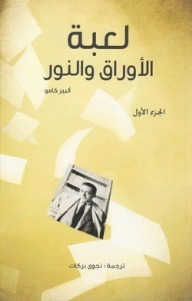What do you think?
Rate this book


261 pages, Paperback
First published January 1, 1962
اليوم استراحة، وقلبي ذاهب للقاء ذاته.
امر غريب. العجز عن البقاء وحيداً. العجز عن عدم البقاء وحيداً، نتقبّل الإثنين. الأثنان مفيدان
تماماً مثلما يجعلنا موت كاتب نبالغ في اهمية اعماله، يجعلنا موت احدهم نبالغ في تقدير مكانته ما بيننا. وهكذا فإن الماضي بأكمله مصنوع من الموت الذي يأهله بالأوهام.
ان الحرب تشنّ بحماسة الذين يرغبون في اندلاعها، بمثل ما تشنّ بيأس الذين يرفضونها بكل ارواحهم.
"انها دائماً لجريمة كبرى ان ندمّر حرّية شعب يحجّة انه يسيء استعمالها" توكفيل
"One thinks one has cut oneself off from the world, but it is enough to see an olive tree upright in the golden dust, or beaches glistening in the morning sun, to feel this separation melt away." (10)Over the past years, I had been haphazardly reading Albert Camus's notebooks, dipping in and out of them as the mood struck. This is usually how I approach collections of notebooks, diaries, letters, and so on. I don't necessarily read them from beginning to end. But there always seems to come a point when I want to read the collection once and for all—to read it more systematically, from beginning to end. Once I've done this, I can not only say to myself that I have read it, but I can also write a review of it—and, in some way, leave it behind (even while knowing that I'll return to it).
"...beauty is unbearable, drives us to despair, offering us for a minute the glimpse of an eternity that we should like to stretch out over the whole of time." (6)

